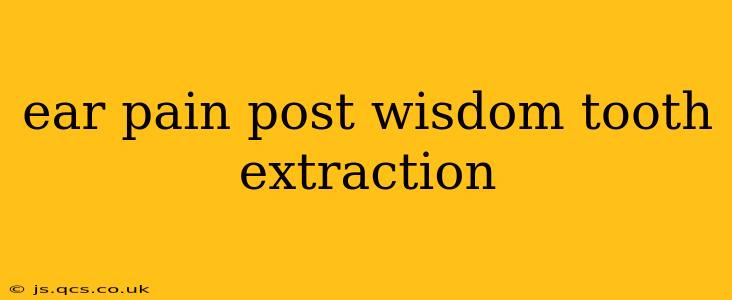Experiencing ear pain after a wisdom tooth extraction is a common complication, often causing significant discomfort and worry. This comprehensive guide explores the reasons behind this pain, effective treatment options, and preventative measures you can take. Understanding the connection between your wisdom teeth and your ears is crucial for managing this post-operative discomfort.
Why Does My Ear Hurt After Wisdom Tooth Extraction?
The proximity of the wisdom teeth to the nerves and structures in your jaw explains why earache is a frequent complaint after extraction. Several factors contribute to this pain:
-
Referred Pain: The trigeminal nerve, a major cranial nerve, innervates both the teeth and the ear. Pain originating from the extraction site can be "referred" to the ear, meaning you feel the pain in your ear even though the source is your jaw. This is a common phenomenon in many parts of the body.
-
Inflammation and Swelling: The extraction site undergoes significant inflammation and swelling after surgery. This swelling can put pressure on nearby nerves and structures, including those that transmit sensation to the ear.
-
Infection: Although less common with proper post-operative care, infection at the extraction site can spread and cause ear pain. Signs of infection include increased swelling, redness, fever, and pus.
-
Sinus Issues (Upper Wisdom Teeth): The roots of upper wisdom teeth are close to the maxillary sinuses. Extraction of upper wisdom teeth can sometimes cause sinus inflammation, leading to pain referred to the ear.
-
Dry Socket: A dry socket occurs when the blood clot protecting the extraction site dislodges prematurely. This exposes the bone and nerves, causing intense pain that can radiate to the ear. This is less common but significantly more painful.
How Long Does Ear Pain After Wisdom Tooth Extraction Last?
The duration of ear pain varies depending on the individual and the specific circumstances of the extraction. Generally, you can expect some level of discomfort for a few days. However, severe or persistent ear pain lasting more than a week warrants a call to your dentist or oral surgeon. Mild pain, particularly referred pain, usually subsides within a week as the inflammation decreases.
What Can I Do to Relieve Ear Pain After Wisdom Tooth Extraction?
Managing ear pain after a wisdom tooth extraction involves both over-the-counter remedies and following your dentist's post-operative instructions.
-
Over-the-Counter Pain Relievers: Ibuprofen or acetaminophen can effectively reduce pain and inflammation. Always follow the recommended dosage on the packaging.
-
Ice Packs: Applying ice packs to the affected area can help reduce swelling and alleviate pain. Use ice packs for 15-20 minutes at a time, several times a day.
-
Salt Water Rinses: Gentle salt water rinses can help keep the extraction site clean and promote healing. Your dentist will likely give specific instructions on how to perform these rinses.
-
Rest: Adequate rest is crucial for healing. Avoid strenuous activity and get plenty of sleep.
-
Avoid Smoking and Alcohol: Smoking and alcohol can interfere with healing and increase the risk of infection.
-
Follow Post-Operative Instructions: Strictly adhere to all instructions provided by your dentist or oral surgeon regarding medication, diet, and oral hygiene.
Is Ear Pain After Wisdom Tooth Extraction Normal?
Some degree of ear pain is relatively common after wisdom tooth extraction, especially in the first few days. However, severe or persistent ear pain, accompanied by other symptoms like fever, swelling, or pus, is not normal and should be addressed immediately by your dentist or oral surgeon.
When Should I Call My Dentist?
Contact your dentist or oral surgeon immediately if you experience:
- Severe ear pain that doesn't respond to over-the-counter pain relievers.
- Increased swelling or redness at the extraction site.
- Fever or chills.
- Pus or drainage from the extraction site.
- Difficulty breathing or swallowing.
How Can I Prevent Ear Pain After Wisdom Tooth Extraction?
While you cannot entirely eliminate the risk of ear pain, you can take steps to minimize the likelihood:
- Follow your dentist’s instructions carefully. This includes taking prescribed medication as directed and maintaining proper oral hygiene.
- Manage expectations. Understand that some discomfort is normal, and be prepared for potential pain.
- Communicate effectively. If you have any concerns before or after your surgery, do not hesitate to contact your dentist or oral surgeon.
This information is for educational purposes only and does not constitute medical advice. Always consult with your dentist or oral surgeon for any concerns regarding your oral health. They can provide a personalized assessment and recommend the best course of action for your specific situation.
